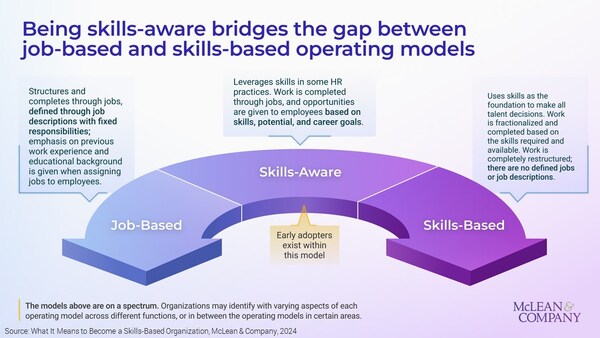McLean & Company, a global HR research and advisory firm, has released a new guide for HR leaders, indicating that the transition to a skills-based organization, while beneficial, requires significant effort and realistic planning beyond mere updates to current practices.
The guide, titled “What It Means to Become a Skills-Based Organization,” suggests that while a skills-based approach to talent management can enhance employee retention and organizational agility, most organizations are not prepared for this shift. The firm identifies a “skills-aware” model as a more feasible interim step that incorporates skills in certain HR practices and offers a balanced path between traditional job-based and fully skills-based models.
Jodi Callaghan, director of HR Research & Advisory Services at McLean & Company, emphasized the critical role of HR in guiding this transformation. “HR leaders are influential decision-makers regarding the feasibility, appropriateness, and scope of a skills-based transformation,” said Callaghan. She noted that currently, the concept of a fully skills-based organization is more theoretical than practical, with most businesses still operating under a traditional job-based model.

The firm’s publication divides the journey toward skills-based decision-making into four main sections, aimed at helping HR professionals understand different operating models, anticipate potential outcomes, and address the challenges of transformation. These sections cover the foundational theories of skills-based organizations, the influences and drawbacks of such models, the obstacles to achieving this transformation, and how to visualize and prepare for future shifts.
The guide also stresses that essential conditions must be met for an organization to progress along the skills-based spectrum, including leadership support, cross-functional collaboration, and adequate resources. McLean & Company advises that the desire to transition alone is insufficient without these foundational elements.
For more information, HR leaders are encouraged to access the full resource on McLean & Company’s website or attend their free upcoming webinars on related topics. Additionally, McLean & Company will be hosting Signature 2024, a premier conference for future-focused HR leaders, from October 27 to 29 at the Red Rock Casino Resort & Spa in Las Vegas, Nevada.





